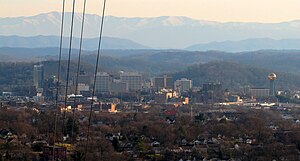Knoxville, Tennessee
Knoxville is the largest city in East Tennessee and the county seat of Knox County. In 2020, its population was 190,740,[1] making it the state of Tennessee's third-most-populous city (after Nashville and Memphis).[2] In 2020, the larger metropolitan area had 879,773 people.[3]
First settled in 1786, Knoxville was the first capital of Tennessee. The city struggled with geographic isolation throughout the early 19th century; the arrival of the railroad in 1855 led to an economic boom.[4] During the American Civil War (early 1860's), the city was bitterly divided over the issue of secession and was occupied alternately by rebelling and U.S. armies, culminating in the Battle of Fort Sanders in 1863.[4] Following the war, Knoxville grew rapidly as a major wholesaling and manufacturing center. After the 1920s, Knoxville's economy stagnated as the manufacturing sector collapsed and the downtown area declined. City leaders became entrenched in highly partisan political fights.[4] Hosting the 1982 World's Fair helped reinvigorate the city,[4] and revitalization initiatives by city leaders and private developers have had major successes in spurring growth especially the downtown area.[5]
Knoxville is the home of the flagship campus of the University of Tennessee, whose basketball and football teams are enormously popular in the entire state. Knoxville is also home to the headquarters of the Tennessee Valley Authority, the Tennessee Supreme Court's courthouse for East Tennessee, and the corporate headquarters of several national and regional companies. The widely visited Great Smoky Mountains National Park is nearby.
Attribution
- Some content on this page may previously have appeared on Wikipedia.
References
- ↑ U.S. Census Bureau QuickFacts: Knoxville city, Tennessee.
- ↑ U.S. Census Bureau, 2010 Census Interactive Population Search. Retrieved: December 20, 2011.
- ↑ 2020 Population and Housing State Data. United States Census Bureau, Population Division (August 12, 2021).
- ↑ Jump up to: 4.0 4.1 4.2 4.3 W. Bruce Wheeler, "Knoxville". The Tennessee Encyclopedia of History and Culture, 2002. Retrieved: February 28, 2008.
- ↑ "Ask Doc Knox", "Downtown's Homegrown Revival", Metro Pulse, November 16, 2011. Accessed at the Internet Archive, October 1, 2015.
